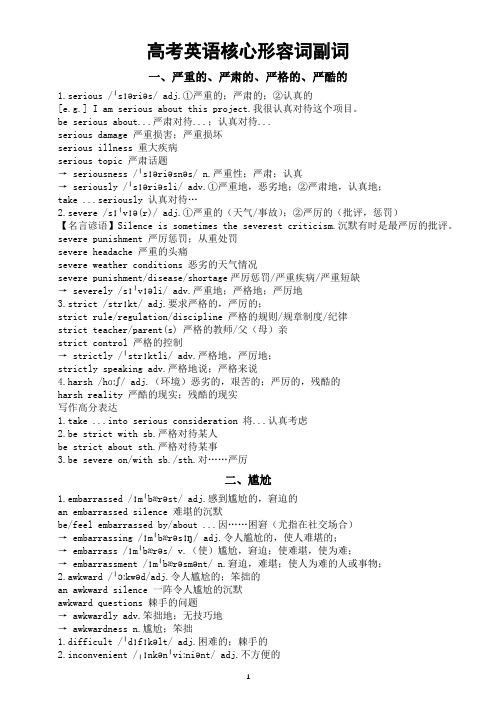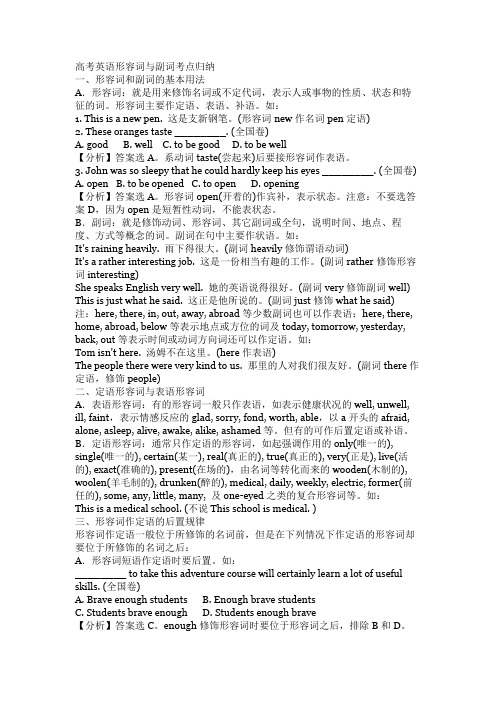高中形容词副词
高中英语语法系列――形容词和副词

高中英语语法系列――形容词和副词[知识梳理]一、形容词的概念与用法形容词(adjective)用以修饰名词,表示人或事物的特征。
它可在句中充当定语,修饰名词、代词;可以作表语或宾(主)语的补足语,表示主语或宾语的状态、特征;有时也可以作状语。
如:This is a beautiful school.这是一所美丽的学校。
(作定语,修饰名词school)I have something important to tell you.我有些重要的事要告诉你们。
(作定语,修饰不定代词something)Our school is beautiful.我们学校很美丽。
(作表语)We’ll make our school more beautiful.我们要使我们的学校更美丽。
(作宾补)Our school will be made more beautiful.我们的学校将会变得更美丽。
(作主补)He got home late that night, hungry and tired.那天晚上他很迟才回来,又累又饿。
(作状语)二、副词的概念与用法副词(adverb)用以修饰动词、形容词或其它副词。
它在句中主要作状语,个别副词也可作表语、定语、或宾(主)语补足语。
He studies hard.他学习很努力。
(作状语,修饰动词)I’m terribly sorry for being late. 非常抱歉,我迟到了。
(作状语,修饰形容词)This coat fits him very well.这件上衣他穿着很合适。
(作状语,修饰副词)The people here are kind to us.这里的人对我们很好。
(作定语,修饰The people)When will you be back? 你什么时候回来?(作表语)三、形容词与副词的转换有的形容词加上ly后可转换成副词,规则如下:注意:friendly, motherly, lovely等词虽然以ly结尾,但不是副词,而是形容词。
高中英语语法—形容词、副词

例题
1) Tony is going camping with ___ boys. A. little two other B. two little other C. two other little D. little other two
答案点拨:C 由"限定词--数词--描绘词--(大小,长短,形状,新 旧,颜色) --性质--名词"的公式可知数词,描绘词,性质依次顺序 只有C符合答案。
2、+ed
excite—excited worry—worried surprise—surprised close—closed interest—interested frighten—frightened
3、+ing
interest—interesting excite—exciting surprise—surprising follow—following
4、+y 所有表示天气状况的的形容词
sun—sunny snow—snowy wind—windy rain-rainy cloud—cloudy health—healthy
5、+ en
wool-woolen wood--wooden
6、+ern (东西南北)
east--eastern south-southern west--western north--northern
多个形容词做定语时的排列顺序:
在不确定的时候,可参照如下口诀: 美小圆旧黄,法国木书房 注释:美——描述性质;小——大小、长短、 高矮胖瘦 旧——新旧、年龄 圆——形状;黄——颜色;法国——产地、 国籍;木——材料;书房——用途 a new red silk cap一顶红色新丝帽 a short young Japanese businessman
高中英语形容词和副词的用法汇总

高中英语形容词和副词的用法汇总形容词和副词一、形容词1. 形容词的位置形容词作定语通常放在它所修饰的名词前面,但在下列情况下,形容词可以或必须后置:1)形容词作定语修饰由some, any, every, no和body, thing, one等构成的复合不定代词时须后置。
如:We shall do everything necessary to bring the murderer to justice.Is there anyone new coming to tonight's meeting?2)以-ible和-able结尾的形容词可置于形容词最高级或only等所修饰的名词之后。
如:He is doing the best job possible.This was the only room available.3)一些表语形容词可置于所修饰的名词之后。
如:These facts alone show that he's not to be trusted.4)形容词短语一般须后置,往往相当于定语从句。
如:He was a king anxious for his people's welfare.2. 前置形容词的排列顺序多个形容词修饰名词时,它们的顺序大致为:描绘性形容词(短词在前,长词在后)→表特征的形容词(包括大小、形状、新旧、年龄等,顺序也大致如此,但不固定)→表颜色的形容词→表类属的形容词(包括专有形容词和表材料质地的形容词)。
如:the beautiful little white Chinese bridgea tall intelligent young British officer二、副词1. 副词的分类副词大体上可分为下面几类:1)时间副词,如before, early, now。
2)地点副词,如everywhere, there, here。
高中英语语法形容词和副词

2. 几种变化形式: as much + 不可数名词 + as There is as much water in this bottle as in that one. as many +可数名词复数 + as
Bob has read as many books as Mary.
as + 形容词 + 不定冠词 + 可数名词单数 + as German is as difficult a language as Chinese. as + 形容词 + 不可数名词 + as Bread is as important food as rice.
4. 作状语
It’s raining heavily.
It’s a rather interesting job.
This is just what I said.
Eventually he arrived in Beijing.
注意:1. 有些副词有两种形式,一种与形容词同形,一 种以ly结尾,但它们的含义不同。 The station is quite near. He lives near.
后置定语: 少数以a开头的形容词(absent, alike, alive, available) 及 其他形容词(concerned, present) 作定语时后置。 He made full use of English reference books available and learned a lot. People concerned will attend the meeting.
“as+形容词+(a/an)+名词+as”表示同级比较,注 意中间的形容词和名词并列时各自所在的位置。 It is generally believed that teaching is as much an art as it is a science.
高中英语:形容词与副词语法知识点

高中英语:形容词与副词语法知识点一、形容词、副词的等级(一)形容词/副词的比较级和最高级构成1.规则形容词级的构成大多数形容词、副词有三种形式: 原级、比较级和最高级。
原级用形容词/副词的原形。
它们的比较级和最高级规则变化如下表:2.不规则形容词的级的构成3.形容词、副词递减的比较等级的构成在形容词、副词前加less和least,表示“较不”和“最不”interesting有趣的 less interesting较无趣的 least interesting最无趣的important重要的 less important较不重要的 least important最不重要的有些形容詞可以加er及est或前面加上more / most來形成比較級和最高級polite –politer 或more polite –politest 或most polite ,这类词还有quiet,handsome,pleasant,common,exact.注意:下列双音节词比较级和最高级加er;est(1).无规律,死记住的词cruel,pleasant quiet civil exact stupid commom,dismal(阴沉的,忧郁的), devine(梦幻的) antique(古老的) grotesque(怪诞的)(2)-le以le为结尾的词idle,feeble, senile(衰老的), agile(灵巧的), nimble(灵活的,敏捷的). Humble(谦虚的,简陋的). Suble(阴暗的,貂皮的), able. Supple(柔顺的,灵活的).gentle.noble.. (3)-y以y为结尾的词lucky happy misty stormy,kingly, naughty, angry timely lively,healthy, heavy,busy,beastly...heavy,busy(4)重音在第二音节上chinese remote afraid alone alike apart polite severe intense obscureprofound(5)-er以ER为结尾的词tender sober clever bitter(6)-owyellow narrow shallow(浅的,表面的) hollow4.没有比较级和最高级的形容词、副词有些形容词由于其本身涵义一般不用来比较。
高中英语语法-形容词和副词

quick、fast与soon: quick往往指反应速度快, fast往往指运动速度快, soon则表示时间上很快即将发生: After a quick breakfast, he hurried to school. A train is much faster than a bus. His father will be back to China very soon.
Tony is going camping with ______ boys. A. little two other B. two little other C. two other little D. little other two
答案:C. 由\“限定词--数词--描绘
One day they crossed the ____bridge behind the palace. A. old Chinese stone B. Chinese old stone C. old stone Chinese D. Chinese stone old 答案A. 年龄+国家+材料。
(3) tall与high: Tall 指身高的高度,用于人和动物, 反义词为 short He is very short/tall. High 指物体的高度,另可形容价格,质量等, 反义词为low The kite is flying very high. Tall和high都可用来指tree, building, tower等, 但mountain只能用high形容。
1.Chinese, glass, a, beautiful, table a beautiful Chinese glass table 2.wonderful, my, garden, new, large my wonderful large new garden 3. a, round, table, small a small round table 4. a, old, dirty, brown shirt a dirty old brown shirt
高中英语2024届高考复习核心形容词副词汇总(共四类)

高考英语核心形容词副词一、严重的、严肃的、严格的、严酷的1.serious /ˈsɪəriəs/ adj.①严重的;严肃的;②认真的[e.g.] I am serious about this project.我很认真对待这个项目。
be serious about...严肃对待...;认真对待...serious damage 严重损害;严重损坏serious illness 重大疾病serious topic 严肃话题→ seriousness /ˈsɪəriəsnəs/ n.严重性;严肃;认真→ seriously /ˈsɪəriəsli/ adv.①严重地,恶劣地;②严肃地,认真地;take ...seriously 认真对待…2.severe /sɪˈvɪə(r)/ adj.①严重的(天气/事故);②严厉的(批评,惩罚)【名言谚语】Silence is sometimes the severest criticism.沉默有时是最严厉的批评。
severe punishment 严厉惩罚;从重处罚severe headache 严重的头痛severe weather conditions 恶劣的天气情况severe punishment/disease/shortage严厉惩罚/严重疾病/严重短缺→ severely /sɪˈvɪəli/ adv.严重地;严格地;严厉地3.strict /strɪkt/ adj.要求严格的,严厉的;strict rule/regulation/discipline 严格的规则/规章制度/纪律strict teacher/parent(s) 严格的教师/父(母)亲strict control 严格的控制→ strictly /ˈstrɪktli/ adv.严格地,严厉地;strictly speaking adv.严格地说;严格来说4.harsh /hɑːʃ/ adj.(环境)恶劣的,艰苦的;严厉的,残酷的harsh reality 严酷的现实;残酷的现实写作高分表达1.take ...into serious consideration 将...认真考虑2.be strict with sb.严格对待某人be strict about sth.严格对待某事3.be severe on/with sb./sth.对……严厉二、尴尬1.embarrassed /ɪmˈbærəst/ adj.感到尴尬的,窘迫的an embarrassed silence 难堪的沉默be/feel embarrassed by/about ...因……困窘(尤指在社交场合)→ embarrassing /ɪmˈbærəsɪŋ/ adj.令人尴尬的,使人难堪的;→ embarrass /ɪmˈbærəs/ v.(使)尴尬,窘迫;使难堪,使为难;→ embarrassment /ɪmˈbærəsmənt/ n.窘迫,难堪;使人为难的人或事物;2.awkward /ˈɔːkwəd/adj.令人尴尬的;笨拙的an awkward silence 一阵令人尴尬的沉默awkward questions 棘手的问题→ awkwardly adv.笨拙地;无技巧地→ awkwardness n.尴尬;笨拙1.difficult /ˈdɪfɪkəlt/ adj.困难的;棘手的2.inconvenient /ˌɪnkənˈviːniənt/ adj.不方便的3.clumsy /ˈklʌmzi/ adj.笨拙的4.ashamed /əˈʃeɪmd/ adj.尴尬的;羞愧的;羞耻的尴尬”的反义词fortable /ˈkʌmftəb(ə)l/ adj.舒适的2.convenient /kənˈviːniənt/ adj.方便的3.handy /ˈhændi/adj.便利的;灵巧的三、好奇1.curious /ˈkjʊəriəs/ adj.好奇的be curious about 对……感到好奇[e.g.]She was curious about the news.她对这个新闻感到好奇。
高考英语形容词与副词考点归纳

高考英语形容词与副词考点归纳一、形容词和副词的基本用法A.形容词:就是用来修饰名词或不定代词,表示人或事物的性质、状态和特征的词。
形容词主要作定语、表语、补语。
如:1. This is a new pen. 这是支新钢笔。
(形容词new作名词pen定语)2. These oranges taste ________. (全国卷)A. goodB. wellC. to be goodD. to be well【分析】答案选A。
系动词taste(尝起来)后要接形容词作表语。
3. John was so sleepy that he could hardly keep his eyes ________. (全国卷)A. openB. to be openedC. to openD. opening【分析】答案选A。
形容词open(开着的)作宾补,表示状态。
注意:不要选答案D,因为open是短暂性动词,不能表状态。
B.副词:就是修饰动词、形容词、其它副词或全句,说明时间、地点、程度、方式等概念的词。
副词在句中主要作状语。
如:It's raining heavily. 雨下得很大。
(副词heavily修饰谓语动词)It's a rather interesting job. 这是一份相当有趣的工作。
(副词rather修饰形容词interesting)She speaks English very well. 她的英语说得很好。
(副词very修饰副词well) This is just what he said. 这正是他所说的。
(副词just修饰what he said)注:here, there, in, out, away, abroad等少数副词也可以作表语;here, there, home, abroad, below等表示地点或方位的词及today, tomorrow, yesterday, back, out等表示时间或动词方向词还可以作定语。
- 1、下载文档前请自行甄别文档内容的完整性,平台不提供额外的编辑、内容补充、找答案等附加服务。
- 2、"仅部分预览"的文档,不可在线预览部分如存在完整性等问题,可反馈申请退款(可完整预览的文档不适用该条件!)。
- 3、如文档侵犯您的权益,请联系客服反馈,我们会尽快为您处理(人工客服工作时间:9:00-18:30)。
语法复习专题四——形容词和副词一、考点聚焦1、形容词、副词的作用与位置形容词是用来修饰名词的,常被放在名词前作定语,或放在系动词后面作表语。
而副词则用来修饰形容词、动词,其他副词或者句子,一般位于形容词之前,动词之后或句子之首。
以下属几种特殊情况,须牢记;(1)形容词短语作定语,定语后置。
a language difficult to master, a leaning tower about 180 feet high(2)表语形容词(afraid、alike、alone、asleep、awake、alive等)作定语,定语后置。
如a man alive。
有些表身体健康状况的形容词如well、faint、ill只作表语。
sick既可作表语又可作定语,ill如作定语意为“bad”。
(3)用作定语,修饰由不定代词one、no、any、some和every构成的复合词如anything、something等时,通常后置。
如:I have something important to tell you.(4)else常用作疑问代词和不定代词的后置定语。
(5)enough、nearby修饰名词前置或后置,程度副词一般位于形容词、副词前面,enough 修饰形容词、副词时,必须后置。
(6)几个副词并列作状语时,其顺序较灵活,但一般是:方式→地点→时间。
如:We had a good time together outdoors last Sunday.(7)频度副词如often、always、usually等在be动词后,行为动词前。
(8)副词作定语,定语后置。
如:The person there is waiting for you.(9)几个并列的形容词作定语,其语序通常为:限定语(The、A)+ 描绘性形容词+ size(大小)+ shape(形状)+ age(年龄、时间)+ color(颜色)+ origin(国籍、来源)+ material (材料)+ purpose(目的)+ 名词。
如:a heavy black Chinese steel umbrella,the man’s first tow interesting little red French oil paitings(10)以-ly结尾的词性辨析。
①下列单词以-ly结尾,但却是形容词而非副词:lively、lonely、lovely、deadly、friendly、ugly、silly、likely、brotherly、timely等。
②表愿意(无-ly)和引申意(有-ly)的副词:deep深wide宽广high高low位置低deeply深入地widely广泛地highly高度地lowly地位卑微③有无-ly意义大不相同的副词:dead完全,绝对be dead asleepdeadly非常be deadly tiredpretty相当be pretty certain that…prettily漂亮地be prettily dressedclose近Don’t sit close.closely密切地Watch closely!late晚、迟arrive late, come latelately最近I haven’t seen him lately(recently).2、复合形容词的构成(1)形容词+ 名词+ ed kind-hearted好心的,white-haired白发的(2)形容词+ 形容词red-hot炽热的,dark-blue深蓝的(3)形容词+ 现在分词good-looking好看的,easy-going随和的(4)副词+ 现在分词hard-working勤劳的,fast-moving快速转动的(5)副词+ 过去分词hard-won得来不易的,newly-made新建的(6)名词+ 形容词life-long终生的,world-famous世界闻名的(7)名词+ 现在分词peace-loving爱好和平的,fun-loving爱开玩笑的(8)名词+ 过去分词snow-covered白雪覆盖的,hand-made手工的(9)数词+ 名词+ edfour-storeyed 4层楼的,three-legged 3条腿的(10)数词+ 名词(名词用单数)ten-year 10年的,two-man两人的3、形容词和副词的比较等级(1)原级的构成和用法。
构成:形容词、副词的原级即本身。
用法:表示双方在程度、性质、特征等某方面相等时,用“as + 原级形容词/副词+ as”的结构;表示双方不相等时,用“not so(as) + 原级形容词/副词+ as”的结构;表示一方是另一方的若干倍时,用“倍数+ as + 原级形容词/副词+ as”的结构。
如:Xiao Wang is as tall as Xiao Yu.This building looks not so (as)high as that one.Miss Xu speaks English as fluently as you .This room is three times as large as that one.(2)比较级和最高级的构成。
掌握比较级和最高级的变化规则,熟记少数不符合规则的特殊形容词和副词。
(3)比较级的用法。
①对方比较,表示一方超过另一方时,用“比较级+ than”的结构表示。
如:This picture is more beautiful than that one.②表示一方不及另一方时,用“less + 原级+ than”的结构表示。
如:This room is less beautiful than that one.③表示一方超过另一方的程度或数量时,可在比较级前加表示程度的状语,如even、a lot、a bit、a little、still、much、far、yet、by fay等修饰。
如:He works even harder than before.注意:英语的比较级前如无even、still或yet等时,译成汉语时可用“较”或“…一些”或不译出,一般不可有“更”。
如:She is better than she was yesterdayPlease come earlier tomorrow.另注意:by far通常用于强调最高级。
用于比较级时,一般放在比较级的后面,如在前面,应在二者中间加“the”。
如:He is taller by far than his brother.He is by far the taller of the two brothers.④表示一方随另一方的程度而变化时,用“the + 比较级(主语+ 谓语),the + 比较级(主语+ 谓语)”的结构(意为“越……越……”)。
如:The harder he works, the happier he feels.⑤不与其他事物相比,表示本身程度的改变时,用“比较级+ and + 比较级”的结构。
如:The weather is getting colder and colder.The girl becomes more and more beautiful.⑥某些以-ior结尾的形容词进行比较时,用to代替than。
这些词有inferior(劣等的,次的)、superior(较好的,优于……)、junior(资历较浅的)、senior(资格较老的)、prior(在……之前)等。
He is superior to Mr.Zhang in chemistry.⑦在比较从句中为了避免重复,我们通常用that(those)、one(ones)代替前面出现的名词。
that指物,one既可指人又可指物。
that可代替可数名词单数和不可数名词,而one只能代替可数名词。
The book on the table is more interesting than that(或the one)on the desk.A box made of steel is stronger than one made of wood.⑧倍数表达法。
(A)A is three(four, etc.)times the size(height, length etc.)of B. 这座新楼是那座旧楼的四倍大(高)。
The new bui9lding is four times the size(the height)of the old one.这座新楼比那座旧楼大三倍(高三倍)。
(B)A is three(four, etc.)times as big(high, long, etc.)as B. Asia is four times as large as Europe.亚洲比欧洲大三倍。
(C)A is three (four, etc.)times bigger(higher, longer, etc.)than B. Your school is three times bigger than ours.你们的学校比我们的学校大三倍。
用times 表倍数通常用于三倍以上,两倍可以用twice或double.(4)最高级的用法。
①三者或三者以上相比,表示最高程度时,用“the + 最高级”的结构表示。
这种句式一般常有表示比较范围的介词短语。
如:Zhang Hua is the tallest of the three.He works(the)hardest in his class.②最高级可被序数词以及much、by far、nearly、almost 、by no means、not quite、not really、nothing like等词语所修饰。
如:This hat is by far / much / nearly / almost / not nearly / by no means / not quite / nothing like the biggest.How much did the secon most expensive hat cost?③表示“最高程度”的形容词,如excellent、extreme、perfect等,没有最高级,也不能用比较级。
④形容词最高级修饰作表语或介词宾语的名词、代词时,被修饰的词往往省略。
如:He is the tallest (boy) in his class.⑤作状语的副词最高级前可以不加定冠词。
如:Of all the boys he came (the) earliest.(5)形容词和副词前面使用冠词的情况。
